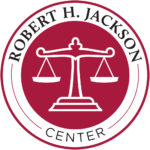Collections
-
Writings
- Law Review Articles about Robert H. Jackson
- Articles About Robert H. Jackson
- Books
- Early Life & Career (1892-1933)
- Treasury Department, Bureau of Internal Revenue (1934-1936)
- Assistant Attorney General, Tax Division (1936)
- Assistant Attorney General, Antitrust Division (1937)
- Solicitor General of the United States (1938-1940)
- Attorney General of the United States (1940-1941)
- Associate Justice of the Supreme Court (1941-1954)
- Nuremberg Prosecutor (1945-1946)
-
Photos
- Early Life & Career (1892-1934)
- Treasury Department, Bureau of Internal Revenue (1934-1936)
- Assistant Attorney General, Tax Division (1936)
- Assistant Attorney General, Antitrust Division (1937)
- Solicitor General of the United States (1938-1940)
- Attorney General of the United States (1940-1941)
- Associate Justice of the Supreme Court (1941-1954)
- Nuremberg Prosecutor (1945-1946)
-
Speeches
- Early Life & Career (1892-1934)
- Treasury Department, Bureau of Internal Revenue (1934-1936)
- Assistant Attorney General, Tax Division (1936)
- Assistant Attorney General, Antitrust Division (1937)
- Attorney General of the United States (1940-1941)
- Solicitor General of the United States (1938-1940)
- Associate Justice of the Supreme Court (1941-1954)
- Nuremberg Prosecutor (1945-1946)
- Supreme Court Opinions
Opinion of the Court, Helvering, Commissioner of Internal Revenue v. Griffiths, 318 U.S. 371 (March 1, 1943)
- FINDLAW:
- Decision Text
Opinion of the Court, West Virginia State Board of Education v. Barnette, 319 U.S. 624 (June 14, 1943)
Background: In January of 1942, the West Virginia Board of Education passed a resolution that made a daily flag salute a requirement in all public schools for both teachers and students. Refusal to participate in the flag salute by teachers was grounds for dismissal and readmission was to be denied until compliance was achieved. For students, the punishment was expulsion from school that would be considered an “unlawful absence” and force the child’s parents or guardians to be liable for prosecution on charges of delinquency. The Barnette sisters were Jehovah’s Witnesses and their father would not allow them to salute the flag as it violated the religion’s Ten Commandments which laid out that the only thing to be worshipped was God. Barnette brought suit in the United States District Court seeking an injunction to restrain the enforcement of the resolution. The suit alleged that the regulation was an unconstitutional denial of religious freedom, freedom of speech, and was invalid under the due process and equal protection clauses of the Fourteenth Amendment.
Supreme Court: Jackson wrote the majority opinion for the Court, which was split 6-3. Jackson held that making it compulsory to salute the flag and pledge allegiance was a violation of the First and Fourteenth Amendments and was not able to be justified as a means of achieving patriotism and national unity. Jackson reasoned that saying the pledge of allegiance was speech as it communicated an expression of set ideas. By making this speech a requirement it violated the First Amendment values.
Legacy: The case was the definitive final answer in a long line of cases regarding religious liberty under the freedom of speech clause of the First Amendment brought by Jehovah’s Witnesses. It overruled their own earlier decision in Minersville School District v. Gobitis which upheld mandatory flag salute and expressions of patriotism within public schools. The case has become a part of our nation’s civic pride, that in public schools every child has the right to believe and practice the ideas or faith that they choose.
- FINDLAW:
- Decision Text
Concurring Opinion, United States v. Swift & Co., 318 U.S. 442 (March 15, 1943)
- FINDLAW:
- Decision Text
- 1
- 2
